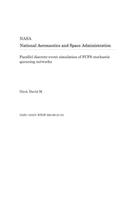
Parallel Discrete-Event Simulation of Fcfs Stochastic Queueing Networks
Series:
Physical systems are inherently parallel. Intuition suggests that simulations of these systems may be amenable to parallel execution. The parallel execution of a discrete-event simulation requires careful synchronization of processes in order to ensure the execution's correctness; this synchronization can degrade performance. Largely negative results were recently reported in a study which used a
NaN
VOLUME
English
Paperback

Physical systems are inherently parallel. Intuition suggests that simulations of these systems may be amenable to parallel execution. The parallel execution of a discrete-event simulation requires careful synchronization of processes in order to ensure the execution's correctness; this synchronization can degrade performance. Largely negative results were recently reported in a study which used a well-known synchronization method on queueing network simulations. Discussed here is a synchronization method (appointments), which has proven itself to be effective on simulations of FCFS queueing networks. The key concept behind appointments is the provision of lookahead. Lookahead is a prediction on a processor's future behavior, based on an analysis of the processor's simulation state. It is shown how lookahead can be computed for FCFS queueing network simulations, give performance data that demonstrates the method's effectiveness under moderate to heavy loads, and discuss performance tradeoffs between the quality of lookahead, and the cost of computing lookahead. Nicol, David M. Langley Research Center NAS1-18107; RTOP 505-90-21-01...
Price Comparison [India]
In This Series
Bestseller Manga
Trending NEWS




















